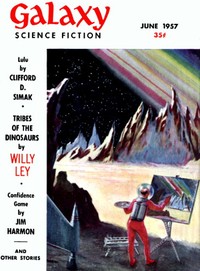Confidence Game by Jim Harmon
"Confidence Game" by Jim Harmon is a science fiction novella written in the mid-20th century, specifically during the late 1950s. This narrative explores themes of addiction, identity, and the implications of time travel through the lens of its characters' struggles. The story blends elements of social commentary with speculative fiction, revealing the complex relationships between individuals and their desires. In "Confidence Game," the protagonist, often referred to as Kevin, navigates a gritty
world alongside his elderly father, known as Doc, who possesses the potential for time travel. As they dwell in the underbelly of society, Kevin battles his deep-rooted addiction to caffeine, a reflection of his desperation and cravings for a life beyond his current circumstances. When Doc's knowledge leads to a series of mysterious disappearances linked to powerful books that don't exist, Kevin grapples with his identity and the legacy of his father. Ultimately, he faces a critical choice between safeguarding a dangerous technology that could angle humanity towards a state of pure reason or destroying it to protect the essence of what it means to be human. The narrative combines a rich exploration of the human psyche with the consequences of ambition, addiction, and the complexities of father-son relationships. (This is an automatically generated summary.)
Read or download for free
| How to read | Url | Size | |||
|---|---|---|---|---|---|
| Read now! | https://www.gutenberg.org/ebooks/51305.html.images | 56 kB | |||
| EPUB3 (E-readers incl. Send-to-Kindle) | https://www.gutenberg.org/ebooks/51305.epub3.images | 262 kB | |||
| EPUB (older E-readers) | https://www.gutenberg.org/ebooks/51305.epub.images | 261 kB | |||
| EPUB (no images, older E-readers) | https://www.gutenberg.org/ebooks/51305.epub.noimages | 84 kB | |||
| Kindle | https://www.gutenberg.org/ebooks/51305.kf8.images | 299 kB | |||
| older Kindles | https://www.gutenberg.org/ebooks/51305.kindle.images | 292 kB | |||
| Plain Text UTF-8 | https://www.gutenberg.org/ebooks/51305.txt.utf-8 | 49 kB | |||
| Download HTML (zip) | https://www.gutenberg.org/cache/epub/51305/pg51305-h.zip | 237 kB | |||
| There may be more files related to this item. | |||||
Similar Books
About this eBook
| Author | Harmon, Jim, 1933-2010 |
|---|---|
| Title | Confidence Game |
| Series Title | Produced from Galaxy Science Fiction June 1957 |
| Note | Reading ease score: 85.4 (6th grade). Easy to read. |
| Credits |
Produced by Greg Weeks, Mary Meehan and the Online Distributed Proofreading Team at http://www.pgdp.net |
| Language | English |
| LoC Class | PS: Language and Literatures: American and Canadian literature |
| Subject | Science fiction |
| Subject | Short stories |
| Category | Text |
| EBook-No. | 51305 |
| Release Date | Feb 26, 2016 |
| Copyright Status | Public domain in the USA. |
| Downloads | 115 downloads in the last 30 days. |
| Project Gutenberg eBooks are always free! | |

